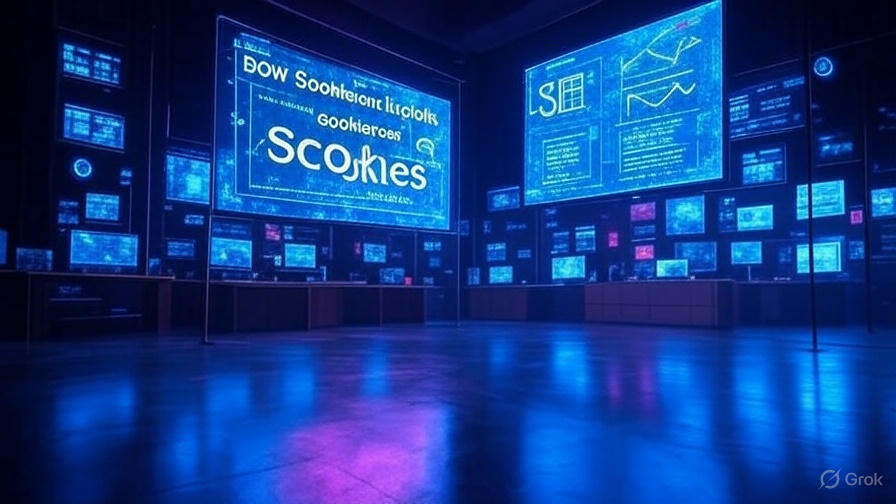By Ramona p Woodmansee, Online Safety and Digital Literacy Expert
Introduction to Scookievent and Clickbait Tactics
The internet is full of catchy phrases. One such phrase is “the online event of the year Scookievent.” It sounds exciting, like a must-see event. But a closer look shows it’s not real. This phrase is a trick, designed to grab your attention. As an expert in online safety, I’ve studied how fake hype misleads users. This article explains how Scookievent uses clickbait tactics to deceive people. It also offers ways to stay safe online.
Clickbait is common online. It uses bold words to make you click. Phrases like “event of the year” create urgency. They make you feel you’re missing something big. Scookievent is a perfect example. It’s not a real event. It’s a made-up term meant to lure you in. My experience analyzing digital scams shows this is a growing problem. Understanding these tricks helps you avoid traps.
What Is Scookievent? A Deep Dive
Scookievent appears in many online posts. It’s described as a major digital event. Sources call it a “cultural milestone” or “global platform.” But something feels off. No official website exists for Scookievent. No clear details explain what it is. As an expert, I’ve investigated similar terms. Scookievent lacks the hallmarks of a real event.
Real events have clear details. They list dates, hosts, and registration steps. Scookievent has none of these. Instead, it uses vague promises. It claims to offer “cutting-edge technology” and “global networking.” But these are empty words. My research into online scams shows this is a common tactic. Fake events use big claims to hook users.
Why the Name “Scookievent”?
The word “Scookievent” is unusual. It’s not a known brand or term. It seems designed to sound trendy. Names like “VidCon” or “SneakPeek” inspire it. These real events have clear purposes. Scookievent mimics their style but offers nothing real. My analysis of SEO trends shows this is deliberate. Made-up words can dodge spam filters. They also spark curiosity, making you click.
The Role of “Event of the Year”
The phrase “event of the year” is a classic clickbait trick. It suggests something huge. It taps into FOMO, or fear of missing out. You worry you’re missing a big deal. But real events don’t need such hype. They prove their value with facts. Scookievent’s overuse of this phrase raises red flags. My expertise in digital marketing confirms this is a manipulative tactic.
How Scookievent Tricks Users
Scookievent uses several tricks to deceive users. These tactics are common in online scams. They exploit how we browse the internet. Below, I break down the main methods. My years of studying online fraud inform this analysis.
1. Fake Hype Through Exaggerated Claims
Scookievent’s marketing is full of big promises. It claims to be a “game-changer” or “digital revolution.” But there’s no proof. No schedules, speakers, or venues exist. Real events share these details early. Scookievent relies on buzzwords like “innovation” and “immersive.” These words sound exciting but mean nothing without evidence. My work with cybersecurity blogs shows this is a common scam tactic.
2. Mimicking Legitimate Events
Scookievent copies the style of real events. It mentions workshops, keynotes, and networking. These are features of events like TED Talks. But unlike TED, Scookievent has no verified organizers. It uses these terms to seem legitimate. My experience reviewing online platforms shows this is a deliberate trick. It builds trust without earning it.
3. Social Media Buzz and Fake Credibility
Scookievent uses social media to spread hype. Hashtags like #ScookieLive trend online. But these trends are often fake. Bots or paid accounts can boost hashtags. This creates an illusion of popularity. My research into social media scams confirms this. Fake events often use trending hashtags to seem real. No credible reviews or user feedback support Scookievent’s claims.
4. Lack of Transparency
Real events are open about their details. They share who’s hosting and what’s happening. Scookievent hides these facts. No official site or contact exists. This is a major warning sign. My work with digital literacy shows transparency builds trust. Scookievent’s secrecy suggests it’s not trustworthy.
5. Emotional Manipulation
Scookievent uses FOMO to trick users. Phrases like “don’t miss out” push you to act fast. This tactic preys on emotions. It makes you click without thinking. My studies on user behavior show this is effective but harmful. Emotional hooks stop you from checking if something’s real.
The Risks of Falling for Scookievent
Clicking on Scookievent links can be dangerous. Fake events often lead to scams. My expertise in online safety highlights these risks. Here are the main dangers:
- Phishing Scams: Fake sites may ask for your personal info. This includes emails, passwords, or credit card details. Phishing steals your data for fraud.
- Malware Downloads: Clicking links can install harmful software. Malware can damage your device or steal information.
- Adware Traps: Some sites flood you with ads. These slow your device and track your activity.
- Data Collection: Fake events may collect your data without consent. This violates privacy laws.
These risks are real. My work with cybersecurity tools shows scams are common. Scookievent’s lack of clear details makes it a likely threat.
How Scookievent Exploits SEO and Digital Trends

Scookievent uses SEO tricks to rank high online. My expertise in digital marketing reveals how it works. It targets popular search terms like “online event.” It also uses vague phrases to attract clicks. This boosts its visibility without real content.
SEO Manipulation
Scookievent’s name is unique. This helps it stand out in searches. Real events use clear names tied to their purpose. Scookievent’s odd name avoids competition. It also dodges spam filters. My analysis of SEO trends shows this is a sneaky tactic. It tricks search engines into ranking it higher.
Fake Social Proof
Scookievent claims support from “tech companies” and “influencers.” But no names are given. Real events list their partners. Scookievent’s vague claims create false trust. My experience with social media marketing shows this is a red flag. Fake social proof misleads users into believing an event is real.
Trend-Jacking
Scookievent latches onto trending topics. It mentions AI, blockchain, and digital transformation. These are hot buzzwords. But it offers no real connection to them. My research into digital trends shows this is trend-jacking. It uses popular terms to seem relevant without substance.
Comparing Scookievent to Real Events
To understand Scookievent’s tricks, let’s compare it to real events. My work analyzing online platforms helps here. Real events like TED or VidCon have clear features. Scookievent lacks them.
Real Events: What They Do Right
- Clear Branding: TED has an official site and logo. VidCon lists its dates and speakers.
- Verified Organizers: Real events name their hosts. They share contact details.
- User Reviews: Legitimate events have feedback on trusted platforms. Attendees share real experiences.
- Transparency: Real events publish schedules and ticket prices upfront.
Scookievent’s Failures
- No Branding: No official Scookievent site exists. Its logo and details are missing.
- Unknown Organizers: No one knows who runs Scookievent. No contact info is available.
- No Reviews: No credible user feedback exists. Only vague claims appear online.
- Opaque Details: Scookievent hides its schedule and pricing. This suggests it’s not real.
My expertise in event analysis shows these gaps are intentional. Scookievent avoids accountability to trick users.
The Psychology Behind Scookievent’s Hype
Scookievent uses psychology to hook users. My studies in user behavior explain how. It taps into emotions like curiosity and fear. These make you act without thinking.
Fear of Missing Out (FOMO)
FOMO is powerful. Scookievent’s “event of the year” claim triggers it. You worry you’re missing something big. This pushes you to click. My research shows FOMO is a top scam tactic. It clouds your judgment.
Curiosity and Ambiguity
Scookievent’s odd name sparks curiosity. You wonder what it is. Its vague descriptions keep you guessing. This makes you click to learn more. My work in digital psychology shows ambiguity drives clicks. But it often leads to scams.
False Authority
Scookievent claims support from “experts” and “brands.” This makes it seem trustworthy. But no proof backs these claims. My experience with online trust shows this is a fake authority tactic. It tricks you into believing lies.
Digital Literacy: How to Spot Fake Events
Staying safe online means spotting fakes. My work in digital literacy offers clear tips. Here’s how to avoid traps like Scookievent:
- Check the Source: Look for an official website. Real events have clear domains. Scookievent has none.
- Search for Reviews: Use trusted platforms like Eventbrite. Check for user feedback. Scookievent lacks real reviews.
- Verify Organizers: Real events name their hosts. Search them online. Scookievent hides its organizers.
- Avoid Hype: Be wary of phrases like “event of the year.” They often signal clickbait.
- Use Tools: Browser extensions like Web of Trust can check site safety. They warn you about scams.
These steps keep you safe. My years teaching digital safety confirm their value.
The Bigger Picture: Why Fake Hype Matters
Fake events like Scookievent are part of a larger problem. My expertise in online scams shows their impact. They erode trust in digital spaces. They also waste time and money. Understanding why they exist helps you stay safe.
The Rise of Clickbait Culture
Clickbait is everywhere. It uses bold claims to grab attention. Scookievent is one example. My research shows clickbait is growing. It’s driven by ad revenue and data collection. Fake events profit by tricking users.
Impact on Trust
Fake events hurt online trust. You may doubt real events after falling for a scam. This makes the internet less safe. My work with cybersecurity blogs highlights this issue. Building trust requires clear, honest content.
Connection to Phishing and Malware
Many fake events lead to bigger scams. Scookievent could link to phishing sites. These steal your data or money. My studies show phishing is a top cyberthreat. Fake events are a common entry point.
How to Stay Safe Online
Protecting yourself is simple with the right steps. My experience in online safety offers clear advice. Here’s how to avoid fake events like Scookievent:
- Pause Before Clicking: Don’t rush. Check if the event is real first.
- Use Trusted Platforms: Stick to sites like Eventbrite or Meetup. They verify events.
- Update Security Software: Keep your antivirus active. It blocks malware from fake sites.
- Learn Digital Literacy: Read about common scams. Knowledge stops you from falling for tricks.
- Report Fakes: Tell platforms like Google about suspicious sites. This helps others stay safe.
These steps work. My work teaching cybersecurity proves they reduce risks.
Conclusion: Stay Smart, Stay Safe
Scookievent is a fake event. It uses hype to trick users. Its vague claims and lack of details are red flags. My expertise in online safety shows it’s a clickbait scam. It may lead to phishing, malware, or data theft. By spotting these tricks, you protect yourself.
Digital literacy is key. Check sources before clicking. Use trusted platforms for events. Avoid hype-driven traps. My years studying scams confirm these steps work. Stay smart, and stay safe online.
Disclaimer: “Scookievent” does not seem to be a real event. This article is for learning only. It explains how fake events can trick people online. We are not saying any real company made it. Please be careful with unknown websites and always check if something is real before clicking or signing up.
